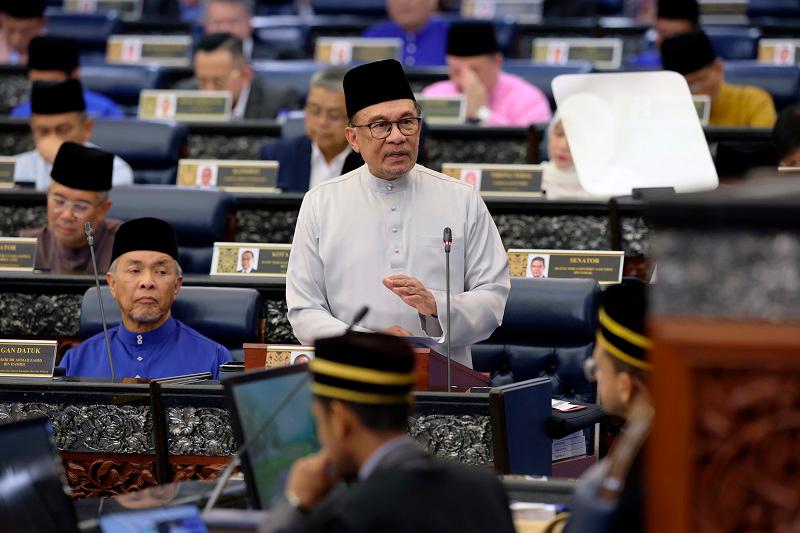KUALA LUMPUR: Budget 2025 worth RM421 billion, the biggest in history, is strategically aligned with the MADANI Economy framework, focuses on attracting high-quality investments, stimulating business opportunities, undertaking projects for the wellbeing of the rakyat and not impacting their affordability in purchasing essential goods and services.
Announcing the budget in Parliament today, Prime Minister Datuk Seri Anwar Ibrahim said it would create jobs and also tackle financial leakages to enhance public spending efficiency.
The initiatives announced in the budget are designed to accelerate Malaysia’s journey to become an economic powerhouse in Asia, positioning it for sustainable growth and resilience.
“The economic performance exceeded expectations, both in terms of growth, investment and the value of the ringgit: reflecting investor confidence and early success from the MADANI Economy’s reform measures.
“Thus, the 2024 GDP (Gross Domestic Product) is projected to be stronger between 4.8 and 5.3 per cent compared to between 4.0 and 5.0 per cent previously.
“Next year, we are confident that the national economy will grow strongly between 4.5 and 5.5 per cent, supported by the measures and strategies of the third MADANI Budget 2025,“ said Anwar, who is also the Finance Minister.
The government maintains an expansionary budget covering RM335 billion for operating expenses, RM86 billion for development, not including RM2 billion in contingency reserves.
Anwar said this year’s revenue collection is again projected to be higher at RM322 billion compared to RM308 billion, while revenue collection in 2025 is expected to continue to rise to RM340 billion.
The tax collected is still among the lowest at 12.6 per cent of GDP in 2023, compared to neighbouring countries like Thailand (16.1 per cent), the Philippines (14.1 per cent), and Singapore (13.7 per cent), he said.
“Actually, we bear subsidies, incentives and assistance reaching RM80 billion last year, which are also enjoyed by the rich and foreigners,“ he said.
Hence, the fiscal reforms that will be implemented next year will be more aggressive, including the progressive expansion of tax revenue and the targeting of subsidies only to the majority of people in need.
Anwar said the sales and service tax (SST) will be implemented more progressively and not burden the people with the progressive expansion of the scope of SST will be implemented effective May 1, 2025.
“Sales tax will not be levied on basic food items used by the people, but will be levied on non-essential goods such as imported premium goods,“ he said.
Meanwhile, the scope of service tax will be expanded to cover commercial services including businesses such as fee-based financial services.
The government also plans to progressively expand the tax base by introducing a dividend tax at a rate of 2.0 per cent on dividend income exceeding RM100,000 received by individual shareholders beginning in the year of assessment 2025.
The rationalisation of RON95 petrol subsidy is also proposed to be implemented in the middle of next year with the savings achieved to be utilised for the welfare of the majority of the people.
The Prime Minister said the government also stated its willingness to implement a global minimum tax (GMT) on multinational companies.
In an effort to restore the economy to a successful path, the Malaysian economy will continue to be accelerated in order to be able to compete in style, based on the framework of the MADANI Economy.
In order to increase national investment, the government agreed to introduce a New Investment Incentive Framework that focuses on high-value activities compared to existing incentives that are based on certain products which is expected to be implemented in the third quarter of 2025.
Anwar said government-linked investment companies (GLICs), through the efforts of GEAR-uP, will increase direct investment in the country amounting to RM120 billion for a period of five years with RM25 billion invested next year.
Following the Johor-Singapore Special Economic Zone (JS-SEZ) memorandum of understanding signed in January, the government approved Forest City as a duty-free island to support tourism and local economic activities.
-- MORE
Budget 2025 Live Updates









